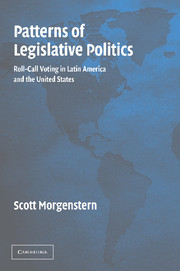Book contents
- Frontmatter
- Contents
- Tables and Figures
- Preface and Acknowledgments
- Party, Faction, and Coalition Names and Abbreviations
- 1 Patterns of Legislative Politics: Identifiability and Flexibility
- 2 Representation and the Agent System
- 3 Identifying Agents
- 4 Influences on Agent Unity: Discipline and Cohesion
- 5 Explaining Voting Unity
- 6 Policy Coalitions and Agent Flexibility
- 7 Conclusion
- Bibliography
- Subject Index
- Author Index
3 - Identifying Agents
Published online by Cambridge University Press: 24 July 2009
- Frontmatter
- Contents
- Tables and Figures
- Preface and Acknowledgments
- Party, Faction, and Coalition Names and Abbreviations
- 1 Patterns of Legislative Politics: Identifiability and Flexibility
- 2 Representation and the Agent System
- 3 Identifying Agents
- 4 Influences on Agent Unity: Discipline and Cohesion
- 5 Explaining Voting Unity
- 6 Policy Coalitions and Agent Flexibility
- 7 Conclusion
- Bibliography
- Subject Index
- Author Index
Summary
Having replaced the term “party system” with “agent system,” this chapter identifies whether parties, factions, or coalitions will be the focus of analysis, based on two factors. The first is the voters' ability to hold the collective group of legislators responsible for their actions given the country's voting system. The second is the degree of unity the group maintains when voting on legislation, though I also take into account the historical trajectory of the agents.
The balloting systems are so significant because they determine whether voters are directed to choose only among parties (or candidates of those parties) or whether the ballot specifies the choice among factions or coalitions as well. The ballot structure thus determines whether voters can hold parties responsible, or whether they can direct their retrospective or prospective votes to the factions or coalitions. I also argue that the electoral systems are important determinants of factionalism.
In Argentina, Brazil, and the United States, ballots only note the partisanship of a candidate or group. In Chile, however, the ballot allows voters to indicate their party and coalitional preference, while Uruguayan voters can choose among factions and parties. Parties are thus vulnerable to voters in all countries, but the coalitions and factions are also open to voter retribution in Chile and Uruguay, respectively. In Argentina and Brazil, as explained more fully in what follows, voters choose a slate of party candidates in each state or province to represent them, and thus the voters may react to the actions of these delegations or those of the national party.
- Type
- Chapter
- Information
- Patterns of Legislative PoliticsRoll-Call Voting in Latin America and the United States, pp. 41 - 84Publisher: Cambridge University PressPrint publication year: 2003



